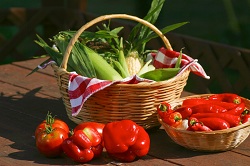| Participating in a local community supported agriculture program (or CSA) can bring a host of wonderful benefits, including healthier and better-tasting food, lower costs, and improved relationships with your neighbors and local environment. Check out our recommended resources to learn more, and see how you can find a community supported agriculture group in your area. |
 
|
|
Sharing the Harvest: A Citizen's Guide to Community Supported Agriculture  |
One of the best methods to obtain fresh, healthy foods, which will nourish your body, and have a lighter impact on the environment at the same time, is to subscribe to a community supported agriculture program (also known as a CSA) in your area.
Community supported agriculture is a concept which originated in Europe, to encourage citizens to support local agriculture, and participate in their local community's food supply.
Basically how community supported agriculture works is that the customer (also called a subscriber, or member) will buy a "share" of a local farm's production for the season. The farm thus has a built-in market for their produce (and the money comes in at the beginning of the season, when they really need it for planting, fertilizing, and other expenses), while the subscriber or member receives fresh food from a local farm, thus saving on transportation and fuel costs typically priced into supermarket produce, and benefiting from much fresher, healthier, and riper food.
 These community supported agriculture programs have moved into the United States, becoming more and more popular over the past several years. They are now common in many areas, especially in more agricultural states.
These community supported agriculture programs have moved into the United States, becoming more and more popular over the past several years. They are now common in many areas, especially in more agricultural states.
So what can you expect to receive from a community supported agriculture program? This will depend on your local area, what types of foods grow in your climate, the length of the growing season, and other factors.
Some common items you may receive could include fruit, a huge variety of vegetables, eggs, dairy, and/or even local meat! Many farms participating in community supported agriculture also offer organic products (of course, picked fresh that morning), usually at a comparable (or even lower) price than what you would pay at your local grocery store, where your food is processed by many hands, transported thousands of miles, and stored for who-knows how long.
Here are some other benefits you may receive from participating in community supported agriculture:
-
A closer connection with your neighbors and nearby farms
-
A greater feeling of connection with your environment
-
More variety in your diet. Numerous studies have shown that a varied diet is the best way to get all the vitamins and nutrients your body needs. Plus the freshness of the food virtually guarantees it will have more nutrients than the food from your local grocery store, which has likely been sitting in storage for long periods of time.
-
If you enjoy cooking from scratch, you will find your creativity in the kitchen challenged, as you find delicious ways to incorporate unexpected new foods into your meals.
-
Develop a personal relationship with the source of your food, leading to a greater awareness of your local area, your environment, and what you put into your body.
-
Spend less money -- and not just because of the great value usually provided by your share in the community supported agriculture program! An unexpected side benefit is that you will find yourself visiting the grocery store less often, and thus will be less tempted by "impulse" buys that you don't really need.
-
A number of other unexpected benefits, and probably some you will come up with on your own, which we haven't even thought of!
There are a number of sources for finding a community supported agriculture program in your area. The best and most up-to-date source we've found is www.localharvest.org. (Just click on the "CSA" tab at the top, or use the search form on the home page and enter your zip code.)